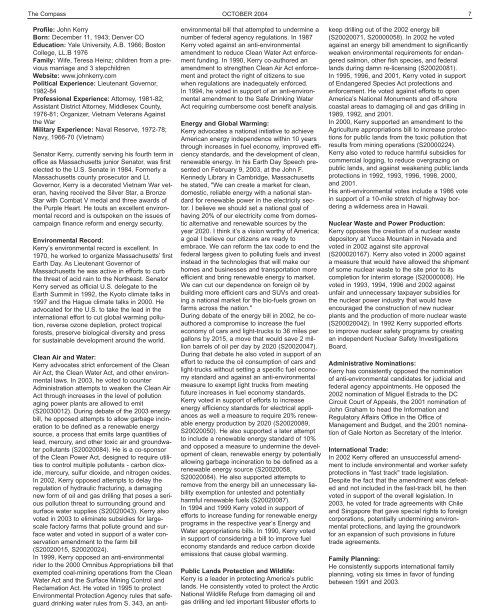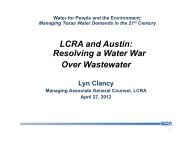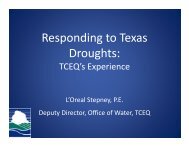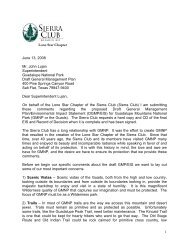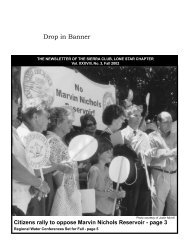The Compass - Lone Star Chapter, Sierra Club
The Compass - Lone Star Chapter, Sierra Club
The Compass - Lone Star Chapter, Sierra Club
You also want an ePaper? Increase the reach of your titles
YUMPU automatically turns print PDFs into web optimized ePapers that Google loves.
<strong>The</strong> <strong>Compass</strong> OCTOBER 2004 7<br />
Profile: John Kerry<br />
Born: December 11, 1943; Denver CO<br />
Education: Yale University, A.B. 1966; Boston<br />
College, LL.B 1976<br />
Family: Wife, Teresa Heinz; children from a previous<br />
marriage and 3 stepchildren<br />
Website: www.johnkerry.com<br />
Political Experience: Lieutenant Governor,<br />
1982-84<br />
Professional Experience: Attorney, 1981-82;<br />
Assistant District Attorney, Middlesex County,<br />
1976-81; Organizer, Vietnam Veterans Against<br />
the War<br />
Military Experience: Naval Reserve, 1972-78;<br />
Navy, 1966-70 (Vietnam)<br />
Senator Kerry, currently serving his fourth term in<br />
office as Massachusetts junior Senator, was first<br />
elected to the U.S. Senate in 1984. Formerly a<br />
Massachusetts county prosecutor and Lt.<br />
Governor, Kerry is a decorated Vietnam War veteran,<br />
having received the Silver <strong>Star</strong>, a Bronze<br />
<strong>Star</strong> with Combat V medal and three awards of<br />
the Purple Heart. He touts an excellent environmental<br />
record and is outspoken on the issues of<br />
campaign finance reform and energy security.<br />
Environmental Record:<br />
Kerry’s environmental record is excellent. In<br />
1970, he worked to organize Massachusetts’ first<br />
Earth Day. As Lieutenant Governor of<br />
Massachusetts he was active in efforts to curb<br />
the threat of acid rain to the Northeast. Senator<br />
Kerry served as official U.S. delegate to the<br />
Earth Summit in 1992, the Kyoto climate talks in<br />
1997 and the Hague climate talks in 2000. He<br />
advocated for the U.S. to take the lead in the<br />
international effort to cut global warming pollution,<br />
reverse ozone depletion, protect tropical<br />
forests, preserve biological diversity and press<br />
for sustainable development around the world.<br />
Clean Air and Water:<br />
Kerry advocates strict enforcement of the Clean<br />
Air Act, the Clean Water Act, and other environmental<br />
laws. In 2003, he voted to counter<br />
Administration attempts to weaken the Clean Air<br />
Act through increases in the level of pollution<br />
aging power plants are allowed to emit<br />
(S20030012). During debate of the 2003 energy<br />
bill, he opposed attempts to allow garbage incineration<br />
to be defined as a renewable energy<br />
source, a process that emits large quantities of<br />
lead, mercury, and other toxic air and groundwater<br />
pollutants (S20020084). He is a co-sponsor<br />
of the Clean Power Act, designed to require utilities<br />
to control multiple pollutants - carbon dioxide,<br />
mercury, sulfur dioxide, and nitrogen oxides.<br />
In 2002, Kerry opposed attempts to delay the<br />
regulation of hydraulic fracturing, a damaging<br />
new form of oil and gas drilling that poses a serious<br />
pollution threat to surrounding ground and<br />
surface water supplies (S20020043). Kerry also<br />
voted in 2003 to eliminate subsidies for largescale<br />
factory farms that pollute ground and surface<br />
water and voted in support of a water conservation<br />
amendment to the farm bill<br />
(S20020015, S20020024).<br />
In 1999, Kerry opposed an anti-environmental<br />
rider to the 2000 Omnibus Appropriations bill that<br />
exempted coal-mining operations from the Clean<br />
Water Act and the Surface Mining Control and<br />
Reclamation Act. He voted in 1995 to protect<br />
Environmental Protection Agency rules that safeguard<br />
drinking water rules from S. 343, an anti-<br />
environmental bill that attempted to undermine a<br />
number of federal agency regulations. In 1987<br />
Kerry voted against an anti-environmental<br />
amendment to reduce Clean Water Act enforcement<br />
funding. In 1990, Kerry co-authored an<br />
amendment to strengthen Clean Air Act enforcement<br />
and protect the right of citizens to sue<br />
when regulations are inadequately enforced.<br />
In 1994, he voted in support of an anti-environmental<br />
amendment to the Safe Drinking Water<br />
Act requiring cumbersome cost benefit analysis.<br />
Energy and Global Warming:<br />
Kerry advocates a national initiative to achieve<br />
American energy independence within 10 years<br />
through increases in fuel economy, improved efficiency<br />
standards, and the development of clean,<br />
renewable energy. In his Earth Day Speech presented<br />
on February 9, 2003, at the John F.<br />
Kennedy Library in Cambridge, Massachusetts<br />
he stated, "We can create a market for clean,<br />
domestic, reliable energy with a national standard<br />
for renewable power in the electricity sector.<br />
I believe we should set a national goal of<br />
having 20% of our electricity come from domestic<br />
alternative and renewable sources by the<br />
year 2020. I think it’s a vision worthy of America;<br />
a goal I believe our citizens are ready to<br />
embrace. We can reform the tax code to end the<br />
federal largess given to polluting fuels and invest<br />
instead in the technologies that will make our<br />
homes and businesses and transportation more<br />
efficient and bring renewable energy to market.<br />
We can cut our dependence on foreign oil by<br />
building more efficient cars and SUVs and creating<br />
a national market for the bio-fuels grown on<br />
farms across the nation."<br />
During debate of the energy bill in 2002, he coauthored<br />
a compromise to increase the fuel<br />
economy of cars and light-trucks to 36 miles per<br />
gallons by 2015, a move that would save 2 million<br />
barrels of oil per day by 2020 (S20020047).<br />
During that debate he also voted in support of an<br />
effort to reduce the oil consumption of cars and<br />
light-trucks without setting a specific fuel economy<br />
standard and against an anti-environmental<br />
measure to exempt light trucks from meeting<br />
future increases in fuel economy standards.<br />
Kerry voted in support of efforts to increase<br />
energy efficiency standards for electrical appliances<br />
as well a measure to require 20% renewable<br />
energy production by 2020 (S20020089,<br />
S20020050). He also supported a later attempt<br />
to include a renewable energy standard of 10%<br />
and opposed a measure to undermine the development<br />
of clean, renewable energy by potentially<br />
allowing garbage incineration to be defined as a<br />
renewable energy source (S20020058,<br />
S20020084). He also supported attempts to<br />
remove from the energy bill an unnecessary liability<br />
exemption for untested and potentially<br />
harmful renewable fuels (S20020087).<br />
In 1994 and 1999 Kerry voted in support of<br />
efforts to increase funding for renewable energy<br />
programs in the respective year’s Energy and<br />
Water appropriations bills. In 1990, Kerry voted<br />
in support of considering a bill to improve fuel<br />
economy standards and reduce carbon dioxide<br />
emissions that cause global warming.<br />
Public Lands Protection and Wildlife:<br />
Kerry is a leader in protecting America’s public<br />
lands. He consistently voted to protect the Arctic<br />
National Wildlife Refuge from damaging oil and<br />
gas drilling and led important filibuster efforts to<br />
keep drilling out of the 2002 energy bill<br />
(S20020071, S20000058). In 2002 he voted<br />
against an energy bill amendment to significantly<br />
weaken environmental requirements for endangered<br />
salmon, other fish species, and federal<br />
lands during damn re-licensing (S20020081).<br />
In 1995, 1996, and 2001, Kerry voted in support<br />
of Endangered Species Act protections and<br />
enforcement. He voted against efforts to open<br />
America’s National Monuments and off-shore<br />
coastal areas to damaging oil and gas drilling in<br />
1989, 1992, and 2001.<br />
In 2000, Kerry supported an amendment to the<br />
Agriculture appropriations bill to increase protections<br />
for public lands from the toxic pollution that<br />
results from mining operations (S20000224).<br />
Kerry also voted to reduce harmful subsidies for<br />
commercial logging, to reduce overgrazing on<br />
public lands, and against weakening public lands<br />
protections in 1992, 1993, 1996, 1998, 2000,<br />
and 2001.<br />
His anti-environmental votes include a 1986 vote<br />
in support of a 10-mile stretch of highway bordering<br />
a wilderness area in Hawaii.<br />
Nuclear Waste and Power Production:<br />
Kerry opposes the creation of a nuclear waste<br />
depository at Yucca Mountain in Nevada and<br />
voted in 2002 against site approval<br />
(S200020167). Kerry also voted in 2000 against<br />
a measure that would have allowed the shipment<br />
of some nuclear waste to the site prior to its<br />
completion for interim storage (S20000008). He<br />
voted in 1993, 1994, 1996 and 2002 against<br />
unfair and unnecessary taxpayer subsidies for<br />
the nuclear power industry that would have<br />
encouraged the construction of new nuclear<br />
plants and the production of more nuclear waste<br />
(S200020042). In 1992 Kerry supported efforts<br />
to improve nuclear safety programs by creating<br />
an independent Nuclear Safety Investigations<br />
Board.<br />
Administrative Nominations:<br />
Kerry has consistently opposed the nomination<br />
of anti-environmental candidates for judicial and<br />
federal agency appointments. He opposed the<br />
2002 nomination of Miguel Estrada to the DC<br />
Circuit Court of Appeals, the 2001 nomination of<br />
John Graham to head the Information and<br />
Regulatory Affairs Office in the Office of<br />
Management and Budget, and the 2001 nomination<br />
of Gale Norton as Secretary of the Interior.<br />
International Trade:<br />
In 2002 Kerry offered an unsuccessful amendment<br />
to include environmental and worker safety<br />
protections in "fast track" trade legislation.<br />
Despite the fact that the amendment was defeated<br />
and not included in the fast-track bill, he then<br />
voted in support of the overall legislation. In<br />
2003, he voted for trade agreements with Chile<br />
and Singapore that gave special rights to foreign<br />
corporations, potentially undermining environmental<br />
protections, and laying the groundwork<br />
for an expansion of such provisions in future<br />
trade agreements.<br />
Family Planning:<br />
He consistently supports international family<br />
planning, voting six times in favor of funding<br />
between 1991 and 2003.


